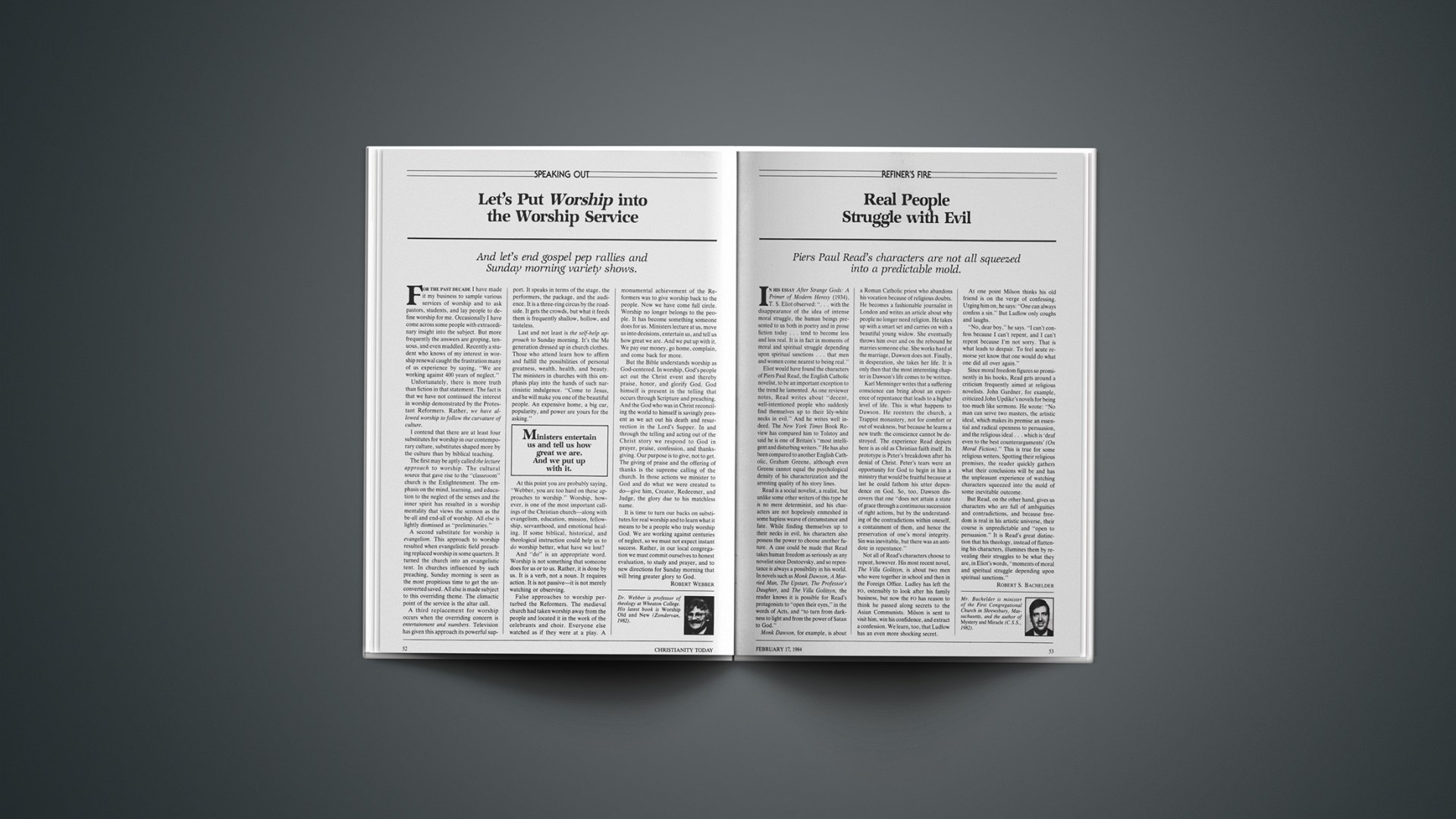And let’s end gospel pep rallies and Sunday morning variety shows.
For the past decade I have made it my business to sample various services of worship and to ask pastors, students, and lay people to define worship for me. Occasionally I have come across some people with extraordinary insight into the subject. But more frequently the answers are groping, tenuous, and even muddled. Recently a student who knows of my interest in worship renewal caught the frustration many of us experience by saying, We are working against 400 years of neglect.”
Unfortunately, there is more truth than fiction in that statement. The fact is that we have not continued the interest in worship demonstrated by the Protestant Reformers. Rather, we have allowed worship to follow the curvature of culture.
I contend that there are at least four substitutes for worship in our contemporary culture, substitutes shaped more by the culture than by biblical teaching.
The first may be aptly called the lecture approach to worship. The cultural source that gave rise to the “classroom” church is the Enlightenment. The emphasis on the mind, learning, and education to the neglect of the senses and the inner spirit has resulted in a worship mentality that views the sermon as the be-all and end-all of worship. All else is lightly dismissed as “preliminaries.”
A second substitute for worship is evangelism. This approach to worship resulted when evangelistic field preaching replaced worship in some quarters. It turned the church into an evangelistic tent. In churches influenced by such preaching, Sunday morning is seen as the most propitious time to get the unconverted saved. All else is made subject to this overriding theme. The climactic point of the service is the altar call.
A third replacement for worship occurs when the overriding concern is entertainment and numbers. Television has given this approach its powerful support. It speaks in terms of the stage, the performers, the package, and the audience. It is a three-ring circus by the roadside. It gets the crowds, but what it feeds them is frequently shallow, hollow, and tasteless.
Last and not least is the self-help approach to Sunday morning. It’s the Me generation dressed up in church clothes. Those who attend learn how to affirm and fulfill the possibilities of personal greatness, wealth, health, and beauty. The ministers in churches with this emphasis play into the hands of such narcissistic indulgence. “Come to Jesus, and he will make you one of the beautiful people. An expensive home, a big car, popularity, and power are yours for the asking.”
At this point you are probably saying, “Webber, you are too hard on these approaches to worship.” Worship, however, is one of the most important callings of the Christian church—along with evangelism, education, mission, fellowship, servanthood, and emotional healing. If some biblical, historical, and theological instruction could help us to do worship better, what have we lost?
And “do” is an appropriate word. Worship is not something that someone does for us or to us. Rather, it is done by us. It is a verb, not a noun. It requires action. It is not passive—it is not merely watching or observing.
False approaches to worship perturbed the Reformers. The medieval church had taken worship away from the people and located it in the work of the celebrants and choir. Everyone else watched as if they were at a play. A monumental achievement of the Reformers was to give worship back to the people. Now we have come full circle. Worship no longer belongs to the people. It has become something someone does for us. Ministers lecture at us, move us into decisions, entertain us, and tell us how great we are. And we put up with it. We pay our money, go home, complain, and come back for more.
But the Bible understands worship as God-centered. In worship, God’s people act out the Christ event and thereby praise, honor, and glorify God. God himself is present in the telling that occurs through Scripture and preaching. And the God who was in Christ reconciling the world to himself is savingly present as we act out his death and resurrection in the Lord’s Supper. In and through the telling and acting out of the Christ story we respond to God in prayer, praise, confession, and thanksgiving. Our purpose is to give, not to get. The giving of praise and the offering of thanks is the supreme calling of the church. In those actions we minister to God and do what we were created to do—give him, Creator, Redeemer, and Judge, the glory due to his matchless name.
It is time to turn our backs on substitutes for real worship and to learn what it means to be a people who truly worship God. We are working against centuries of neglect, so we must not expect instant success. Rather, in our local congregation we must commit ourselves to honest evaluation, to study and prayer, and to new directions for Sunday morning that will bring greater glory to God.
Dr. Webber is professor of theology at Wheaton College. His latest book is Worship Old and New (Zondervan, 1982).










